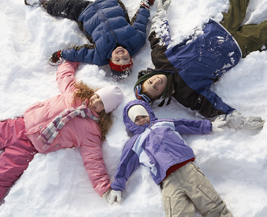Building a snowman is a great childhood memory of mine. In many cities, snow is falling and children are excited to play in it. Our children should be dressed properly, and parents must decide if the temperature is too low, or not, for your child to play in.
Frostbite is the freezing of superficial tissues of the face, ears, fingers and toes. Signs and symptoms include: numbness, pain, tingling, burning, skin turns hard and white, skin starts to itch, skin starts to peel or blister, etc.
 |
| Always remember to wear gloves in snow and freezing temperatures. Frostbite can occur. |
Hypothermia is a more severe reaction to exposure to cold, is defined as a significant drop in body core temperature. Symptoms of hypothermia includes: shivering; as well as, intense shivering, lack of coordination and sluggishness; cold sensation, goosebumps, confusion, and numbness; difficulty speaking, mental confusion, stumbling, depression; unconsciousness; trouble seeing; etc. *Check out more symptoms, safety tips, and how to treat frostbite and hypothermia at our ‘source,’ to keep our children and yourself safe, in the winter weather. If either is suspected, call 911. Bundle up and dress for the weather!
Copyright, Winter Weather Safety: Protect Your Child from Frostbite and Hypothermia, Sharon Rose,
Parents Want to Know 101, January 31, 2019. All rights reserved.





